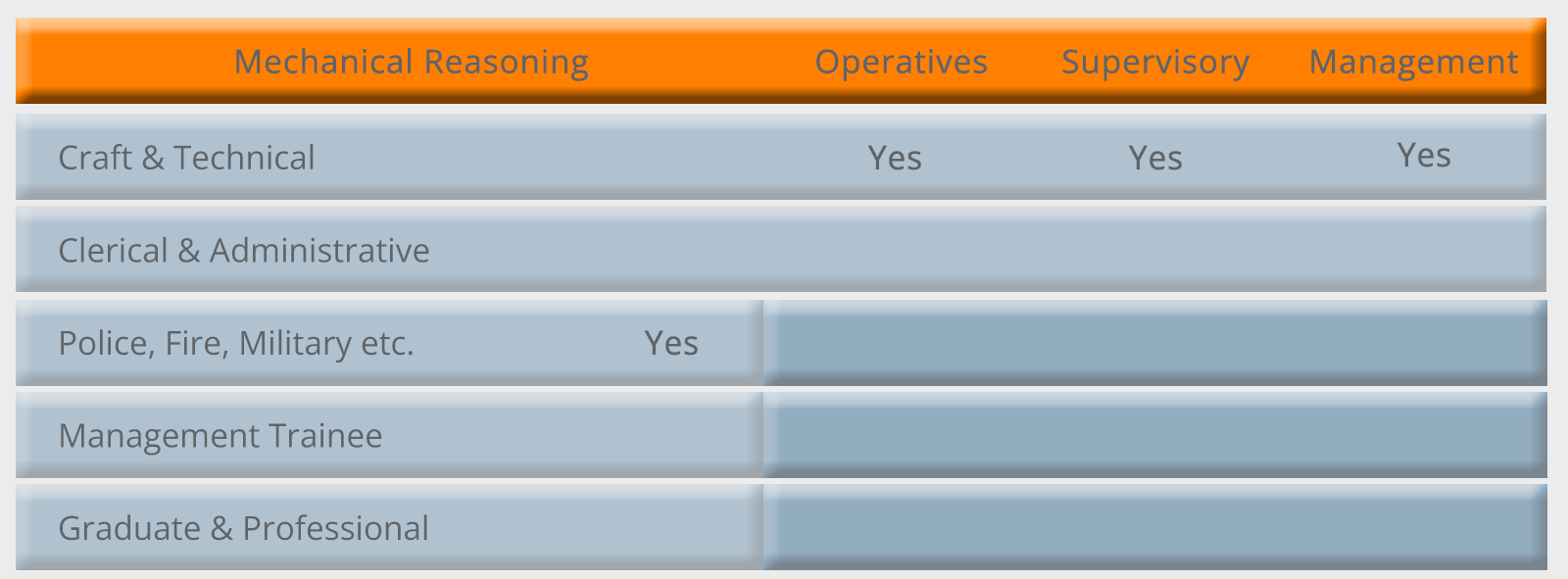Free Practice Mechanical Reasoning Tests
Updated November 6, 2024
Mechanical reasoning tests are designed to assess your knowledge of physical and mechanical principles.
Prepare for Any Job Assessment Test with JobTestPrep
Prepare for Any Job Assessment Test with JobTestPrep
Mechanical reasoning questions vary widely in difficulty from test to test and because of this it is not easy to produce a practice test applicable to everyone.
You may find that some of the questions in the practice tests available on this website are too detailed and difficult for your needs.
If you are taking a mechanical reasoning test as part of the selection process for the emergency services or the military then the questions you can expect will tend to concentrate on principles rather than on making calculations.
For example, you may be shown three diagrams of a lever and asked which one is the most efficient.
If however, you are taking a test for a craft or technical job then you may be expected to calculate the actual force required to move a particular lever.
In this case, knowing the principle is not enough, you need to know the formula.

Prepare for Any Job Assessment Test with JobTestPrep
If you need to prepare for a number of different employment tests and want to outsmart the competition, choose a Premium Membership from JobTestPrep.
You will get access to three PrepPacks of your choice, from a database that covers all the major test providers and employers and tailored profession packs.
Prepare for Any Job Assessment Test with JobTestPrep
Mechanical reasoning tests are used to select for a wide range of jobs including the military (Armed Services Vocational Aptitude Battery), police forces, fire services, as well as many craft, technical and engineering occupations.
The practice tests available at the moment are most applicable to technical and engineering jobs.
This sample question paper contains 20 questions and has a suggested time limit of 15 minutes.
The questions are presented in Letter/A4 format for easy printing and self-marking.
Mechanical Reasoning for Emergency Services and Military Jobs
If you are taking a mechanical reasoning test as part of the selection process for the emergency services or the military then the questions you can expect will tend to concentrate on principles rather than on making calculations.
For example, you may be shown three diagrams of a lever and asked which one is the most efficient.
This is very different from craft and technical tests where you will usually be expected to make calculations.
Mechanical Reasoning for Craft and Technical Jobs
If you are taking a test as part of the selection for a craft or apprenticeship job, then you may be asked some questions about tools and how they are used.
You should also expect some shop arithmetic questions.
These questions approximate the type of reasoning and maths that are needed to estimate materials costs, etc.
Mechanical Reasoning: Remember, the Scenario Is Incidental
Many of the questions in mechanical reasoning tests are ‘industry’ specific.
For example, tests used by the fire service tend to frame the questions in terms of fire-fighting whereas tests used to select for an aircraft maintenance job would tend to frame the questions in aviation industry terms.
It doesn’t matter if the questions you practice on aren’t specific to the industry you are applying for.
It is the substance of the question that is important – the scenario is incidental.
Frequently Asked Questions
Having mechanical reasoning skills means you understand mechanical and physical concepts such as levers, pulleys, gears, springs, electrical circuits, tools, basic arithmetic and fault diagnosis.
Your knowledge base and skill set will differ slightly depending on your industry.
Emergency services and military roles will require you to understand the principles rather than make the calculations.
Craft and technical roles require basic mathematics, knowledge of tools, and an understanding of principles appropriate to your trade.
To improve your mechanical reasoning test performance, you need to study as much as possible before your test. Invest in study packs, speak to recruiters about the subjects the test might cover and complete online practice tests.
Maximize your concentration and retention levels by maintaining a healthy diet, exercising, getting enough sleep and drinking plenty of water.
Watching tutorial videos about the various concepts and trying them for yourself (if safe to do so) will also improve your understanding.
Mechanical reasoning tests are typically used for engineering roles, emergency services, military, software developers, technicians, production workers and tradespeople.
To pass your mechanical reasoning test, you need to commit to a study period before the test.
As these aptitude tests cover a multitude of topics, you want to ensure you have enough time to study all the topics relevant to your role.
During your study period, complete as many practice exams as possible under timed conditions; this will help you with your time management and highlight the areas that need extra attention.
Speak to those already working in your job role and ask what subjects were on their tests and any advice they might have.
The more information you have, the better prepared you’ll be.
To prepare for a mechanical reasoning test, you should first create a study schedule that gives you enough time to study all the subject areas and allows for relaxing and other responsibilities.
Next, you should gather as much information from those who have already taken a mechanical reasoning test. You can find these people on LinkedIn, at the companies you want to work for, or on online forums.
Ask them about the test day procedure, how they found the time limit, the question format, and the subjects covered.
You should attempt as many practice tests as possible, eventually building up to timed conditions during your study period as well.
To help with your concentration and information retention, ensure you eat healthily, get enough sleep each night, drink plenty of water, and exercise regularly.
There are several websites you can use for mechanical reasoning test preparation. Some offer free, limited resources, while others charge but offer a more comprehensive package.
A score of 80% or above is considered a good score for a mechanical reasoning test, though some employers may accept 70%.
Depending on the test you take, 80% will be different.
The Bennett Mechanical Comprehension Test has 55 multiple-choice questions. To get 80%, you would need to answer 44 questions correctly.
The Wiesen Test of Mechanical Aptitude (WTMA) consists of 60 questions, making 80% 48 correct answers.
With aptitude tests, employers typically only invite those with a score of 80% or more to the next stage. It can then be argued that any score below 80% is a fail.
However, there is no defined fail mark.
Depending on the test you take, mechanical aptitude tests range from 25 to 45 minutes. They consist of 50-75 questions.






